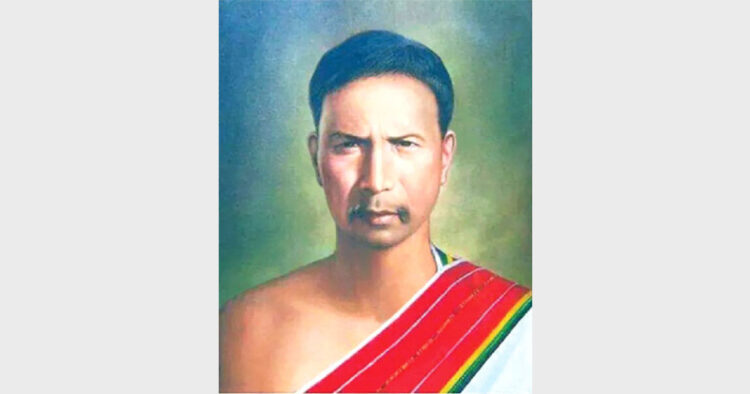Jadonang was born in the village of Kambiron (also known as Puilon) in the Tamenglong district of Manipur in 1905. By the age of ten, he was praying for extended periods of time, visiting sacred sites such as the Bhuvan Cave (near Silchar, Assam) and Zeilad Lake (Manipur), and making predictions, in addition to employing indigenous herbs and remedies as healing agents for individuals who came to him with various diseases.
Jadonang, on the other hand, witnessed the spread of Christianity as he grew up. This, he believed, was a tool of British imperialism. By that time, the British had established control in and around the present-day Tamenglong district, sending officers to monitor governance. The conversion attempts of British missionaries in the region, according to Jadonang, constituted a major danger to indigenous Naga beliefs, customs, and society. Of course, there were the economic expenses placed on the Nagas by British imperialism, such as exorbitant taxes, colonial law, and an oppressive porter system.
Many Zeliangrong households converted to Christianity out of need, expecting that appeasing the British would alleviate their financial hardships. Jadonang’s beliefs regarding the revival of indigenous Naga culture, the political struggle against the British, and social change began to take shape in his late teens and early adulthood. He was a member of the Rongmei Naga tribe, which is part of Zeliangrong. His adherents admired his link with God and prophecy because he was a healer, spiritual adviser, and messiah. Jadonang was a vocal opponent of British rule and the changes taking place in the region, which were distinguished by inequities, labour exploitation, and taxation, among other things. He created the ‘Heraka’ reformed religion, which was later defined and carried on by his pupil Gaidinliu. It was a socio-political movement based on ancient Naga practices and culture. In response to colonial control, the necessity to modify their religion in light of the introduction of Christianity, and the looming ethnic conflict with the Kukis, he evoked nationalism for the Nagas. The movement that arose among the Zeliangrong people in the 1920s was founded and led by him. The origins of the Jadonang movement may be traced back to the 1920s, following the creation of the Naga Club in 1918, the First World War (1914-18), and the Anglo Kuki War (1917-19). According to certain published sources, the movement was active from 1927 until 1932.
In the Zeliangrong campaign, Jadonang employed the phrase ‘Naga Raj’ or ‘Makam Gwangdi’—liberation for the Nagas from British domination. He envisioned the creation of a Naga monarchy. The North Cachar Hills, Manipur, and the Naga Hills were at the forefront of the campaign. He toured numerous towns and villages in the early stages of the campaign to mobilise people, and he also reached out to other Naga tribes, including the Angami of Khonoma village, as well as neighbouring Naga tribes such as Chakhesang, Maos, and Marams.
The interaction with Khonoma was documented in a message between JP Mills, the then-deputy commissioner of Naga Hills, and JC Higgins, Manipur’s political agents, who expressed concern about Jadonang receiving support from Khonoma village. The British feared that other Naga tribes’ support for the Jadonang-led rebellion would turn into a larger anti-British movement.
The movement started out as a socio-religious one. Later, in 1930, the movement became political, and he encouraged his supporters to be prepared to engage in civil disobedience. He advised them to quit paying taxes to the British government and to refuse free labour for government officials and the Manipur monarch.
Many Zeliangrong households converted to Christianity out of need, expecting that appeasing the British would alleviate their financial hardships. Jadonang’s beliefs regarding the revival of indigenous Naga culture, the political struggle against the British, and social change began to take shape in his late teens and early adulthood
Mahatma Gandhi was said to be a favourite of Jadonang. Early in 1927, he attempted to see the “Father of the Nation” in Silchar, Assam, in order to get his support with a group of 100 boys and 100 females. However, his hopes of meeting Gandhi were dashed when he cancelled his trip to Silchar. He went on to compose a song in Gandhi’s honour. This anecdote must be viewed in the context of Jadonang’s and Gandhi’s shared desire to free people from British colonial domination. The Zeliangrong movement under Jadonang grew in popularity as more individuals joined it, bringing it under the scrutiny of the British administration. Higgins, with the assistance of Mills and C Gimson, deputy commissioner of Cachar, arrested Jadonang on the allegation of creating Naga Raj and for his defiance to the government on February 19, 1931. Higgins also accused him of masterminding the assassination of four Manipuri traders in April 1930. He denied his involvement in the murders and even claimed his innocence to the governor of Assam, which was rejected. On August 29, 1931, Jadonang was sentenced to death and hanged on the banks of the Nambul River in Imphal.
After Jadonang’s execution on August 29, 1931 in Imphal, his unwavering courage was handed on to his stalwart follower, the renowned Rani Gaidinliu, who successfully led the revolution until 1940. Haipou Jadonang is now considered one of the tallest freedom fighters in northeast India. He is no longer with us, buthis unwavering courage will live on in the annals of history.




















Comments